I am late today because I am writing this in London after travelling the last…
Europe – the deliberate wastage of its youth continues
Earlier this month (August 11, 2017), Eurostat published the latest European Union data for – Young people in the EU: education and employment. This data now allows us to track the fortunes of three age cohorts – 15-19, 20-24 and 25-29 years since before the crisis to the end of 2016. So a teenager prior to the crisis (2007) would be transiting into the 25-29 years cohort in 2016. One of the disturbing trends shown in the data is the increasing number of young people in the older ‘youth’ categories that in 2016 we classified as being Neither in Employment, nor in Education or Training (NEET). Some will have been in that category for the entire duration of the crisis – that is, they dropped out of school early, are not receiving any skills development and are unemployed. Whereas in 2007, the proportion of NEETs in the 25-29 years cohort was 17.2 per cent, that figure has risen to 18.8 per cent by 2016 (although the peak of 20.7 per cent was reached in 2012). This suggests that the systems which provide transitions between education and employment are not working effectively because the demand-side of the labour market is deficient. That is, there is a lack of jobs available overall and the most disadvantaged youth workers are at the back of the queue along with the disabled and other stigmatised cohorts (for example, Roma people in the European context). There is an urgent need for a true Youth Job Guarantee, to replace the faux Youth Guarantee that was introduced in 2012. But then that would require abandoning the obsession with austerity and dysfunctional fiscal rules. The European Commission’s answer to the problem will be to have another ‘summit’ or two and issue plenty of statements replete with motherhood statements.
A recurring theme among mainstream economic commentators is that the ageing societies that the Western nations are experiencing will eventually impose massive health and pension costs, which governments will be unable to afford. The claims of financial incapacity are, of course, fallacious.
As I noted in yesterday’s blog – When neo-liberal masquerades as anti-establishment – there are no financial constraints on governments being able to fund pensions, health care and other services that may arise as the population ages and the workforce shrinks.
The real challenges of a rising dependency ratio will be the real resources that the society can command in the future.
Clearly, future generations will have to be more productive than past generations to support a broader group of citizens who are no longer working and require more intensive service support.
In that context, it is imperative that we improve our public education and health systems and ensure that all our young people are engaged in skill development to prepare them for the future productive challenge that we will place on them
In that context, fiscal austerity, which leaves a significant proportion of human resources idle, runs down public education capacity, delivers sub- standard health outcomes, is the opposite to what is required to prepare for the future.
The European Union introduced a Youth Guarantee in 2012 to target the NEET cohort. I have written about that in the following blogs (among others):
1. 4 years later – the European Youth Guarantee is an under-funded failure.
2. Latest news on European Youth Guarantee hardly inspiring.
3. European Youth Guarantee audit exposes its (austerity) flaws.
4. Youth Guarantee has to be a Youth Job Guarantee.
In general, I have not been impressed by the effectiveness of the under-funded Youth Guarantee, which was focused more on supply-side improvements (training, presentation etc) than it was on actually solving the problem of youth unemployment by creating jobs.
If the Youth Guarantee was working we should have seen the NEET cohort largely eliminated by now – 4.5 years on.
The latest data from Eurostat certainly reinforces the point that the NEET problem has been moving through the age cohorts as the crisis has endured.
Eurostat report that:
1. “Almost 90 million people aged 15-29 live in the European Union (EU). This represents 17% of its population.”
2. “the proportion of young people neither in employment nor in education or training (NEET) increases considerably with age. The NEET rate, which stood at 6.1% for the age group 15-19 in 2016, tripled to 18.8% for those aged 25-29.”
3. “In 2016, almost 1 in 3 young people aged 20-24 was neither in employment nor in education or training in Italy (29.1%) … Greece (23.0%) … and about 1 in 5 in Spain (21.2%)”
4. “At EU level, the equivalent of the total population of Ireland – almost 5 million young persons aged 20-24 (16.7%) – were in 2016 neither in employment nor in education or training.”
5. There are massive regional disparities.
The Eurostat presentation provides one view of the data. I decided to explore the data more closely and the following graphs are relevant.
The first series show the Education and Employment Status for the three age cohorts (15-19, 20-24, and 25-29) for the EU28 as a whole for 2016 (blue bars) and 2007 (red triangles).
The message is that the situation for 15-19 year olds hasn’t changed much, which is unsurprising, given that participation in formal education dominates that age bracket.
What is apparent is that their employment rate has dropped from 6.1 per cent in 2007 to just 3.8 per cent in 2016. A higher proportion are exclusively in education, which might mean that the lack of employment opportunities has forced teenagers to remain at school.
There is evidence that this is not necessarily a good thing because some students are better off leaving school and developing job-specific skills and work experience.
A similar trend exists for the 20-24 years bracket. A higher proportion have remained exclusively in education and there has been a dramatic drop off in the proportion employed (from 38.4 per cent in 2007 to 33.4 per cent in 2016).
But the NEET proportion has risen substantially between 2007 and 2016 for this group – from 15.2 per cent to 16.7 per cent, which reflects, in part, the time-flows of teenagers who were dislocated by the recession and subsequent austerity.
These time-flow effects are very noticeable in the next cohort – 25-29 year olds. Their participation exclusively in education has been nearly constant (slightly rising) but their NEET rat has risen from 17.2 per cent in 2007 to 18.8 per cent in 2016, as their employment rates have fallen from 62.9 per cent to 59.5 per cent.
The scarring from these flow effects through time will be massive. This is a group that should normally be almost totally in employment developing career profiles.
But 18.8 per cent are doing nothing to advance their skills or work experience or earning income.
Eurostat also provide data by Member States.
While at the EU28-level, the proportion of NEETs has risen in all youth cohorts bar the 15-19 group, the aggregate data hides marked regional disparities across the Union.
The following map is taken from the Eurostat release and shows this geographic disparity at at 2016 for the 20-24 years cohort.
There is a strong correspondence between the harshness of the austerity imposed and the proportion of NEETs across the European Union.
The next graph is also taken from the Eurostat release and shows the change in NEET rate for the 20-24 years cohort between 2006 and 2016.
The disparity is significant.
To show how these disparities have flown through to the next age cohort as the recession endured and the austerity deepened, I graphed the change in NEET status for the 25-29 year old cohort between 2007 and 2016.
The patterns are predictable – Greece, Spain and Italy have seen the largest change in NEET status for this early Prime-Age worker cohort.
The 25-29 age period is a time when a worker should be in the early stages of career building and accumulating essential on-the-job skills and experience.
However as a result of the poor policy framework in the European Union and the excessive austerity, many EU28 Member States have seen huge shifts in NEET status for this cohort.
It is almost unbelievable that the European Commission would deliberately run a policy regime that would generate this outcome.
Remember that the currency-issuing government always chooses the unemployment rate. In the European context, that is blurred by the creation of the common currency and the lack of fiscal capacity at the federal level.
It is clear that the ECB issues the currency and has been funding governments since the crisis (as I will write in a blog to come).
It is also clear that the European Commission has been imposing vicious austerity on to Member States – almost in direct proportion with the severity of the recession encountered in each State – which is madness in itself.
Taken together, the policy arms at the European Union level have created a situation where 33.5 per cent of Greeks of the age 25-29 years are in the NEET category – going nowhere, doing nothing, wasting away.
The proportion for Italy is 32.3 per cent, Spain 24.2, Ireland 19.4 per cent, Portugal 17.2 per cent.
Conclusion
There is no possible justification for this deliberate waste of labour resources.
And as I have said in the past – these effects endure across the generations.
Teenagers deprived of opportunities become young adults with inherited disadvantage. If that deprivation continues they enter the 25-29 years cohort – disadvantaged and starting to make families in poverty.
Many will never enjoy any labour market continuity and their children then inherit that disadvantage and so the impacts widen and stretch out across time.
This latest data shows that is definitely happening.
The principle policy response to the problem was the Youth Guarantee. Unfortunately, it was underfunded and poorly conceived – focusing on supply rather than job creation.
What is needed is large-scale job creation schemes – actual jobs at fair pay – funded by the European Commission. That will not happen and so in a year’s time I expect to be reporting on similar data trends.
Madness prevails in the European Union.
Sydney Event – Future of Work and Welfare
For those living around Sydney, Australia, I will be speaking on Thursday afternoon at a Workshop – Right2Work Sydney: Future of Work and Welfare – which has been organised by the Right2Work Coalition and Australian Unemployed Workers’ Union.
The event will run from 14:00 and finish at 16:00.
The location is at the Unions NSW offices, level 3, 4 – 10 Goulburn Street, Sydney, Australia 2000.
I will be debating well-known sociologist Eva Cox, who considers a UBI to be the way forward. I will be discussing employment guarantees in that context.
Crowdfunding Request – Economics for a progressive agenda
At time of writing 62 per cent raised with only 5 days left.
I received a request to promote this Crowdfunding effort. I note that I will receive a portion of the funds raised in the form of reimbursement of some travel expenses. I have waived my usual speaking fees and some other expenses to help this group out.
The Crowdfunding Site is for an – Economics for a progressive agenda.
As the site notes:
Professor Bill Mitchell, a leading proponent of Modern Monetary Theory, has agreed to be our speaker at a fringe meeting to be held during Labour Conference Week in Brighton in September 2017.
The meeting is being organised independently by a small group of Labour members whose goal is to start a conversation about reframing our understanding of economics to match a progressive political agenda. Our funds are limited and so we are seeking to raise money to cover the travel and other costs associated with the event. Your donations and support would be really appreciated.
For those interested in joining us the meeting will be held on Monday 25th September between 2 and 5pm and the venue is The Brighthelm Centre, North Road, Brighton, BN1 1YD. All are welcome and you don’t have to be a member of the Labour party to attend.
It will be great to see as many people in Brighton as possible.
Please give generously to ensure the organisers are not out of pocket.
That is enough for today!
(c) Copyright 2017 William Mitchell. All Rights Reserved.
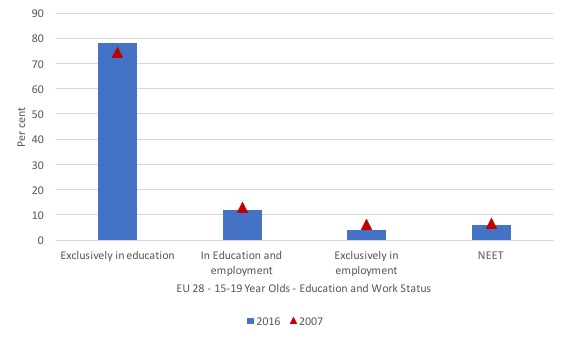
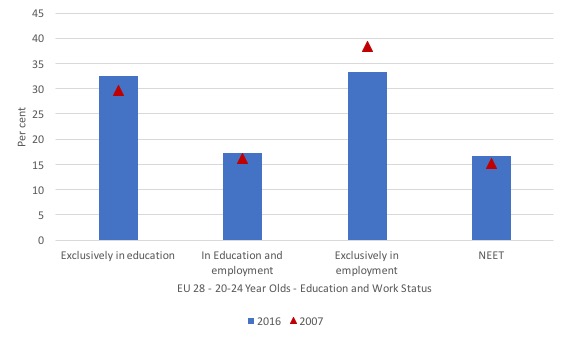
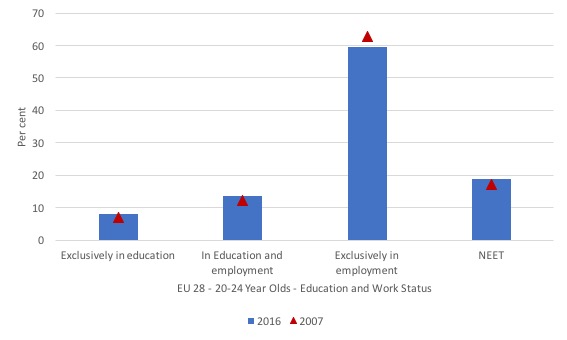
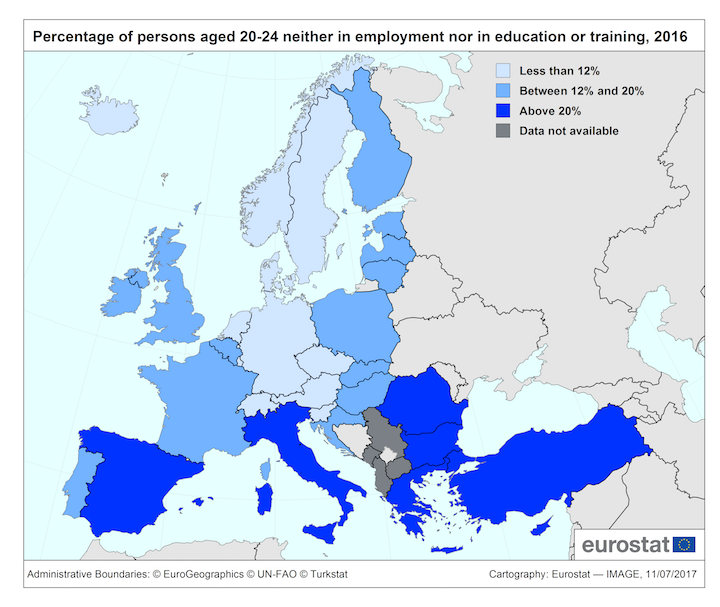
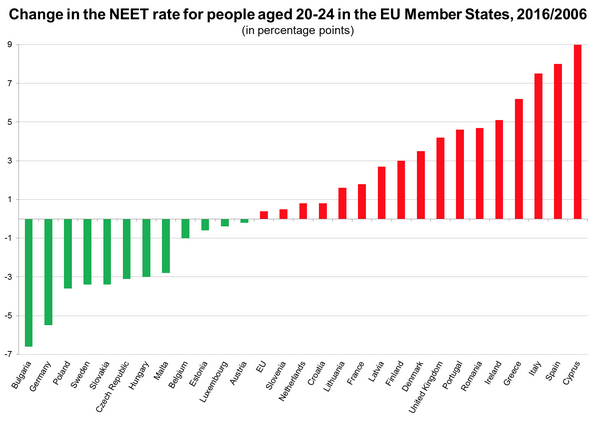
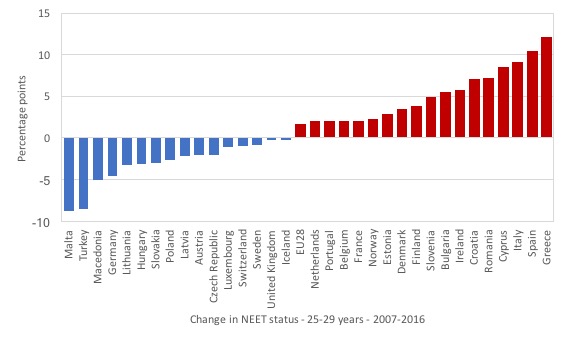
People have been weeping and wailing about high youth unemployment for half a century or more. I’m sure there are plenty of public sector jobs where one can earn good money, especially in Brussels, as a professional weeper and wailer.
However, can I do something utterly outrageous and suggest a solution? What about a stonking great employment subsidy for youths, maybe paid for by a tax on prime aged labor? I mean employers do respond to prices, supply, demand, etc don’t they? If youths are available at $1/hr, employers will take them on, won’t they? Or have I missed something?
Bill,
From the charts it appears Ireland is in a similar position to S.Europe yet is now a. Celtic Tiger again apparently?
To: Ralph Musgrave.
If a Job Guarantee person is employed by the State, there would be no wage paid to her by another employer. The person would be employed as a valued employee who would only leave the JG job if an opportunity arose with a private employer, probably paying a higher wage, and having regard to the rights of the JG person. It seems to me that in the situation you describe, the JG recruit would perhaps not be guaranteed her rights by a private employer. I am reminded of the bad conditions which some temporary recruits (on state unemployment benefit) endured, having been allocated to GB employers (at nil cost to the employer). I think that these $1 a day recruits would suffer in the same way, possibly. And when would they rise to be on a permanent salary?
Ralph
You are on the doorstep of one of the most productive car plants in Europe, at Sunderland.
A lot of that has to do with the UK’s very flexible labour market, a lack of regulation compared with Europe.
Nissan’s British management have had to promise to meet tough cost-cutting targets; in a previous Micra model, 72% of its components were made in the UK, that proportion was reduced to just 55-60% in a subsequent model; component manufacturers in Britain were expected to lose out to the tune of £100m a year and Nissan’s Sunderland workforce agreed to go onto a new, more flexible shift system.
That is what the a free (fair) market indirectly imposes on the labour forces of the world. Do we really want governments to get involved in this morass to the extent that is envisaged by MMT ideology and the commitment to Job Guarantee.
Someone is going to have to spell all this out in some detail – unless we are allowed to just drift into it.
Dear Ralph Musgrave,
I will do something even more utterly outrageous.
If youth jobs are subsidised by a tax on wages of the remaining workers then in a Keynesian framework there will be a reduction of aggregate demand due to lower total wage bill as the owners of capital will have to pay less for the same amount of labour (even assuming a lower level of skills of young workers). Lower aggregate demand means less need for investment at least during the initial period. Both will lead to lower total employment. On the other hand if the shape of the saving function of the rich doesn’t change, their income coming from profits may not change much except for the impact of the falling investment. So the rich will get relatively richer, being able to claim even more land and other natural resources and the workers as a class will get less thanks to the subsidy to youth jobs. This will bring us a even closer to the ultimate goal of the neoliberals that is the restitution of the fully-blown post-industrial feudalism where serfs work for free for the right to use (previously) common resources, the plebs gets feed with the waste products like in ancient Rome and the rich harvest rents on everything. And there is no way to opt-out. We have already seen this in the IT sector looking at what has been achieved by Microsoft, Google, Facebook Oracle, Amazon and (recently) Uber. Especially when intellectual property rights have been invented to provide more virtual goods on which monopoly rents can be claimed.
Is this what you want to achieve?
“That is what the a free (fair) market indirectly imposes on the labour forces of the world.”
Only because there are fewer jobs than people. Once you have more jobs than people then the market indirectly imposes the restriction on the capital flows of the world – and they earn less.
The Nissan plant in Sunderland is there to pay decent wages to the people that work there. If it doesn’t do that, then there is no point having it there. We may as well do something else with the manpower and physical resources.
The economy serves the people, not the other way around. We are not in a battle between nations to get labour costs to the lowest amount.
Neil,
Between 1981 and 1997 the North East lost over 110,000 in primary and manufacturing industries. The Nissan plant was part of the process to rejuvenate a region that had seen its coal-mining and shipbuilding industries decimated.
Without that investment a Job Guarantee would no doubt have helped filled the vacuum, yet despite its humane motives it would not have matched the hard-driven Nissan worker returns, nor made as much contribution to GDP or maintained Britain’s economic standing in the world.
If capital markets are forced to earn less than what they consider to be a “justifiable” investment return it will be restricted or may not take place at all – in our current competitive world this may result in investment moving offshore.
An obvious way to counteract this would be for investment returns to become universal, no matter where it is made. That however would fundamentally change the long-accepted concept of commercial risk taking.
I would be surprised if you or Bill were envisaging such a transformation; to a method of economic evaluation utterly different to that used since the birth of the industrial revolution. However, your comments about the economy serving the people do not demonstrate the practicalities of how this is achieved.
The MMT basis of how an economy functions is impressive and is gaining acclaimed acknowledgement but its practical application will require more than impressively rational answers. I genuinely look forward to contemporary examples to study.
Dave Kelly,
“It seems to me that in the situation you describe, the JG recruit would perhaps not be guaranteed her rights by a private employer.” I wasn’t advocating JG: that’s a separate issue. Certainly any youths who found employment under a “subsidise youths and tax prime age employees” system would not get totally secure employment. But then most normal jobs (i.e. non-JG jobs) are not totally secure anyway. A series of insecure jobs is better than no job. Plus a series of insecure jobs is not a bad option for youths: it enables them to try out different types of employment. There’s plenty of millionaires that started out with a series of low paid bum jobs.
Gogs,
I don’t see why employment subsidies and taxes are a “morass” (if that’s what you’re saying). We’ve had an employment tax in the UK for decades: employer’s National Insurance contribution. Plus we’ve had literally dozens of different employment subsidy over the last 50 years or so.
Adam K,
If my “subsidy/tax” idea did lead to a fall in demand, that’s easily dealt with via stimulus: standard Keynsian / MMT thinking.
Re the possibility that it leads to greater inequality, that is equally easily dealt with via increased income tax and/or beefed up social security. In fact the Italian economist Vilfredo Pareto was keen on the latter point, i.e. that any inequality increasing effect of a proposal doesn’t matter because if the proposal increases GDP, then in principle the entire population can be made better off by fiddling around with tax and social security, plus any inequality increasing effect can be countered by the latter “fiddling”.
Ralph,
Government intervention is an area of limitless possibilities, far wider than subsidies and taxes. It is possible to think of it re-shaping the role of Capitalism. That needs to be spelled out, and the practical (and political) aspects of its implementation. It might indeed present an interesting morass.
“in our current competitive world this may result in investment moving offshore.”
Bye, bye then.
And when you say that you’ll find that the ‘commercial considerations’ in reality aren’t quite what the rhetoric says it is.
You seem to be under the impression that commercial investment is required, and has to be competed for.
It isn’t and it doesn’t.
Corporations are servants that are allowed to use the resources of the nation. If one corporation doesn’t want to use them, then it is very straightforward to create a different one. The brilliance is in the people, not the capital structure.
The myth of foreign direct investment is just that. A narrative to try and maintain power and control. You don’t need any of that once you reject the neo-liberal tenets. Because in a floating rate currency there is no actually such thing as foreign investment. They don’t make Sterling anywhere else.
Similarly with the fixation on manufacturing you see from some on the Left. It’s not as big a deal as they like to make out – primarily because the future of manufacturing is robotic.
So you make stuff where it is strategically sensible to do so in geo-political terms. Because you don’t trust other nations to maintain a stable exchange of goods and services overall. And yes because it gives some people interesting things to do.
“I mean employers do respond to prices, supply, demand, etc don’t they? If youths are available at $1/hr, employers will take them on, won’t they? Or have I missed something?”
You’ve missed productivity as you always do.
More hand car washes rather than better machines is heading back towards feudalism.
We don’t want private employers hiring people. We want them to hire robots and automation via capital investment. That’s how we drive productivity forward and a better standard of living for all.
Ideally the private sector should only employ robots, and humans should work outside the private sector concentrating on creating output of social value.
Neil,
You don’t mention the role competition plays in determining economic success (or an alternative basis for allocating resources); since the inception of the industrial revolution competition has been highly influential in establishing a hierarchy of living standards.
To alter that concept (which appears to be your aim) surely the role of competition needs to be spelled out.
Neil Wilson
“Ideally the private sector should only employ robots, and humans should work outside the private sector concentrating on creating output of social value.”
Marvellous. A world where my friends and I can live our dream of running our own whisky bar and drinking the profits, while hiring musicians to entertain us and our patrons.
Though on a serious note in a full employment society, people would be free to choose from jobs rather than compete for scarce one. People would be free to start their own enterprises.
This has to go in hand with social guarantees of free education, free universal healthcare, public transport, state owned water, electricity and telecommunication infrastructure to work for a public purpose and a policy of housing affordability and fair wealth distribution.
Our current system is insane. I’m currently forced into insecure labour. That income gives me the ability to save some of my income, but all I can afford is share housing. I can’t afford to study anymore (It means stopping work and having an enormous debt) I find myself asking the question, what am I working towards?